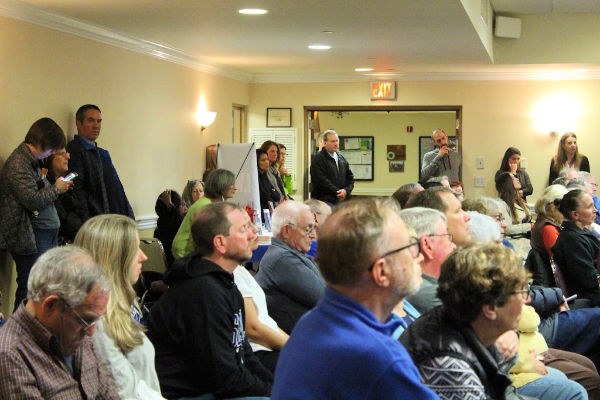On Wednesday, May 1, the Junior Woman’s Club of Verona held a forum for the five candidates running for Town Council: John Fio Rito, Christine McGrath, Michael Nochimson, John Quattrocchi and Alex Roman. The forum was held at the Verona Community Center in front of a capacity crowd of about 150 people.
The event, which was moderated by the League of Women Voters, presented the candidates with questions on open space and overdevelopment, affordable housing, the challenges of governing in Verona, downtown business development, taxes and budget issues, government communications with residents, environmental policy and sustainability, water quality and stormwater run-off, and the use of the payment-in-lieu-of-taxes (PILOT) monies collected from several developments in town. You can click on any of those terms to jump to the section of the video below in which they are answered.
For the most part, the candidates stuck to the facts on each issue. But there were a few misstatements. Some might be considered minor: When Fio Rito challenged the usefulness of PILOT agreements, he said that their terms are 20 years. By state statute, PILOT agreements run for 30 years. Verona also has only 19 zoning districts, not the 27 asserted by Fio Rito. And Fio Rito said that Verona should in the future have inclusionary zoning, that is, require an affordable housing component in every project. But as Roman notes in his response, the Council already did that last year. (Read: Ordinance 2018-25 here.) Roman is seeking a second term on the Council.
Nochimson, who is running for his third term on the Council, called COAH a lawsuit, which is not quite correct. The Council on Affordable Housing (COAH) was the state agency responsible for setting the affordable housing obligations of every town in New Jersey. Former Gov. Chris Christie tried to suspend it in 2010, setting up disorderly demise in 2015 that has left the state Superior Courts in charge of setting affordable housing quotas. Verona has been meeting regularly with a court-appointed official called a special master to show that we are working to meet our future obligations, which now stand at 238 units. Lawyers for several potential developers, who are also sometimes referred to as “intervenors”, have been trying to challenge that on a variety of fronts and force Verona into a so-called builder’s remedy. That could mean we’d have to allow housing complexes that are far larger and denser than we would otherwise want. Verona has published all the legal back and forth on its municipal government website.
Affordable housing was the subject of some of the more striking misstatements during the Forum. Fio Rito said this regarding the development being envisioned for the former Cameco factory on the west side of Verona: “Cameco, I have to object, it’s a terrible idea,” Fio Rito said. “Dropping a hundred low-income housing units in one geographic area is a mistake. It’s a mistake that started in the 40s and the 50s, we’ve been knocking ‘em down since the 60s. It doesn’t work. Putting all your poor people into one geographic area is called a ghetto.”
But the Cameco project would not be housing for poor people; it is not a Section 8 development. “Affordable housing” is, in basic terms, housing that is more affordable than the existing properties in a town. In our area, a property designated as “affordable” needs to be within the budget of people earning between $47,250 and $75,360 a year. That would be, as Quattrocchi noted in his response, people like teachers and police officers. As MyVeronaNJ.com reported last November when the Town Council first proposed buying the Cameco property, Verona intends to flip it to a developer with the requirement that up to 100% of the units be affordable. A 100% affordable project is now being built in North Caldwell beyond the mansions that are going up on the western side of White Rock Road.
(In responding to MyVeronaNJ.com’s first candidate question in early April, Fio Rito did seem to understand what affordable housing is. “The median household income of Verona is $100,366 (Google),” he wrote then. “That means if a household earns $79,000 a year, it is, by definition – low income. If a household income is less than $50,000 it’s defined as very low income. Who makes less than $50,000? A new Verona police officer. A Patrolman, Step 1 in the VPD makes about $41,000; and is, by definition, very low income and qualifies for affordable housing. It’s almost criminal that a Verona cop – charged with protecting and serving Verona – probably can’t afford to live in Verona.”)
McGrath asserted that Verona had made mistakes in implementing affordable housing. ““I think the best way to handle affordable housing in the future is to make sure we don’t repeat the mistakes of the past,” she said at the forum. “Verona in the last 15-20 years has not followed the spirit of the Mount Laurel decision, which is, as you develop you need to make sure to put aside affordable housing. We have built on the Hilltop, Bahr Lumber and Verona Place and most egregiously Annin without any setting aside of affordable housing. This was a big strategic mistake and we have to make sure we don’t make it again.”
“Mount Laurel” is shorthand for a 1975 New Jersey Supreme Court ruling that barred towns from enacting exclusionary zoning rules that would prevent the constructing of housing for lower-income people. The New Jersey Fair Housing Act of 1985, passed in the wake of the second Mount Laurel case, created COAH.
Verona fully met its obligations for the first and second COAH quotas, and even had a surplus after the second round. Construction of the first of the apartments known as the Highlands at Hilltop began during that period in 2009. The apartments were originally supposed to be age-restricted, but in 2010 Verona’s Town Council allowed the development to switch to an age-targeted format. The Town Council directive that began the redevelopment of the former Bahr Lumber sites on Durrell Street happened in December 2011, while Verona was also in COAH compliance. Same for Verona Place, whose developer won approval for the project from the Verona Board of Adjustment in January 2014. Verona was also in compliance in May 2014 when the issue of Annin’s redevelopment first went to the Council. Annin’s founding family pulled that plan and put the property up for sale shortly thereafter. All of these properties were built by private developers, not the municipal government.
In March 2015, New Jersey’s Supreme Court stripped COAH of responsibilities–before the body could issue a third round of quotas. Verona, and all other New Jersey towns, were left with no idea of whether they would need to add affordable units. That was the reality when Russo Development presented its plan for Annin to the Town Council in September 2015. Verona did not get clarity from the court on how many new affordable units it will need until after the Annin project was substantially completed.
You can watch the Forum in full in the video below:




I don’t want to sound pejorative about being fact checked, but let’s be clear on what has been interpreted as a misstatement.
1. The NJ Long Term Tax Exemption Statute NJSA 40A:20-12(a) states that the MAXIMUM term of a tax abatement is 30 years (35 from ordinance adoption). It does not state a minimum. So, we could issue 10, 15, 20 or 30 year abatements at the Township’s discretion. This fact check actually illustrates my point, the lack of experience with this topic has the distinct probability of causing long term harm. In this case 30 years, so it’s even worse then I stated.
2. 19 zones is still a lot of zones for a town the size of Verona and I think that was the gist of my comment and why we need to revise the Master Plan.
3. ORDINANCE No. 2018-25 only applies in the case the developer is seeking a zoning change or variances. If it is an as of right project, inclusionary zoning and this ordinance is not applicable. This doesn’t go far enough to meet the intent.
4. Section 8 is a housing choice voucher program where an individual can apply for a housing subsidy voucher and use it wherever it’s accepted. “Section 8” is not necessarily, especially recently, a single housing project. So, it is extremely likely that a low income individual or family could apply for a Section 8 voucher and use it at the proposed Cameco project. But that’s not really the point. As I stated in my answer to question 1 about Overdevelopment, it’s not a question if we need affordable housing, we do; it’s about the practical application of how we do it. Consolidating all low income housing in one geographic area has proved to be a failed experiment over the last 50 years. Mixed income is how it’s done today. That we are even discussing stepping back into time and repeating the mistakes of the past astounds me. Furthermore, when the Cameco plan was spoken about at a December council meeting, the number was 60 units; now it’s 100. It will be more by the time the final plan is issued. Cameco, as currently proposed, is a terrible idea.
5. I stand by all my conceptual responses at the forum and reject the assertion that any of them were misstatements other than the number of zones in Verona.